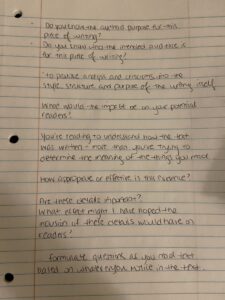“You are already an author,” we ourselves write in our lives daily, whether it be to express our opinion, informing a friend about how our day went, or writing given assignments. Reading like a writer provides a new perspective to the normal reading and writing techniques that are most common, which is to “read for content or to better understand the ideas.”
Mike Bunn’s article supported the new insight with certain lines depicting just that-
“You’re reading to understand how the text was written- more than you’re trying to determine the meaning of the things you read”
“…to provoke analysis and criticisms into the style, structure, and purpose of the writing itself.”
By reading like a writer, you can learn why each added component of a story is important and what it resembles. You are viewing the piece of writing as if you were the author. Picking apart a sentence and figuring out why it was written the way it is will help you understand what the writer is trying to intentionally depict in the story, such as their purpose and who their intended audience is. You can improve your writing by isolating certain writing techniques and using them to your advantage. The better you can articulate your thoughts, the better you can help the reader understand. The after effect of formulating questions as I read will help concise my thoughts, and allow me to broaden my writing techniques, which will be beneficial in the future.
After reading How to Read Like a Writer, I would like to try formulating questions more often as I read and to develop better writing techniques to arouse my reader’s curiosity; finding out which techniques would provide advantages and disadvantages when writing certain genres.
“What effect might I have hoped the inclusion of these details would have on readers? How appropriate or effective is this evidence?”
Word choice plays a huge role in reading and writing, and taking the time to ponder why I decide to use such words will allow me to make sure I’m properly helping the reader envision aspects of the story, such as the scenery or mood. Details can also help invoke emotions which can be advantageous depending on the genre I am writing.





Leave a Reply